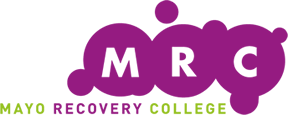Peer support working is also a feature of mental health services in our region.
It involves the employment of individuals with ‘lived experience’ who have been trained and employed by the HSE to offer and receive help based on shared understanding, respect and mutual empowerment. Peer support workers share experiential knowledge and use coaching and communication skills to encourage others with personal recovery and to provide a sense of belonging through recovery promoting relationships. Peer support worker also often co produce and co deliver in the Recovery College.
Relative Peer Support offers families/friends of those with mental health challenges an opportunity to meet with a Relative Support Worker who has lived experience of supporting a loved one with mental health difficulties.
Relative peer support is recovery orientated with the focus on inspiring hope for the future and supporting family members on the recovery journey. Relatives are offered on-going emotional support, collaborative life skills work, links to community services in order to build resilience and assist the family to cope more positively with the challenges they are facing.
Bealach Nua offers this service to relatives who have a loved one linked to Mayo Mental Health Services. This service is jointly managed by Shine in partnership with Mayo Mental health Services.
Contact details for this service are as follows:
Maria Mcgoldrick, Relative Peer Support Worker, 086 0450835
Co-Delivery is a model by which each course is delivered by an expert by experience and training qualifications and an expert by profession.
The educational philosophy of the Mayo Recovery College is grounded in the college’s commitment to a general humanistic, person centred and developmental perspective. This perspective has evolved from consultation and deliberation with external advisors and those with lived experience of mental illness.
The educational position of the Recovery College is person-centred. Person-centred in that it is developmental and facilitative and that it seeks to encourage students through participation to “recognise the connections between their individual problems and experiences and the social contexts in which they are embedded”.
The aim of Recovery education is to educate on, discuss and de-mystify Mental Health and related issues in a “trialogical” manner (people afflicted with mental health problems, family, friends, professionals and the wider community); and to assist people to imagine and realise a desirable future.
Co-Production is a process in which experts by profession and experts by experience (service users, family members) work collaboratively to design a course or a scheme of work (if more then a single session), with subsequent session plans produced as necessary.
Each co-producer should have equally valued input into the course content and the finalised documentation. All comments and opinions should be fully explored and respected with time given for a full time-limited consultation process.
Any discrepancies should be dealt with and concluded within this co-production/consultation process.
The finalised document should reflect all positive contributions made during the co-production process.
All sessions/courses should adhere to the outset fidelity criteria and contribute to mental health and wellbeing!
Contact
Mayo Recovery College
Mayo Mental Health Services &
Atlantic Technological University,
St Michael's,
Westport Road,
Castlebar,
Co. Mayo
T: 086 0294901
E: [email protected]
Our Vision
The Purpose of the Mayo Recovery College is to create a culture of recovery, to improve quality of life and promote social inclusion by empowering people with mental health challenges, their families, friends and the community through co-produced education and learning together.
© 2020 Mayo Recovery College. All Rights Reserved.
Design & Development by Avenir Design, Ltd.
